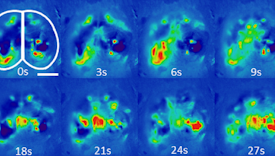
Bill Catterall received a B.A. in chemistry from Brown University in 1968, a Ph.D. in physiological chemistry from Johns Hopkins University School of Medicine in 1972 and postdoctoral training in neurobiology and molecular pharmacology as a Muscular Dystrophy Association Fellow with Marshall Nirenberg at the National Institutes of Health (NIH) from 1972 to 1974. Following three years as a staff scientist at NIH, Catterall joined the University of Washington in 1977 as associate professor of pharmacology, became professor in 1981, and served as chair from 1984 to 2016. As Chair of Pharmacology, he led an internationally recognized research and educational program, which was ranked fifth worldwide by U.S. News & World Report in 2016, and he founded interdisciplinary undergraduate and graduate programs in neuroscience.
Catterall discovered the voltage-gated sodium and calcium channel proteins, which initiate electrical and chemical signaling in excitable cells. His work has contributed much to understanding their structure, function, regulation, molecular pharmacology and roles in diseases, including epilepsy, autism, periodic paralysis and heart failure. Catterall was the most highly cited ion channel researcher from 2004 to 2016 as ranked by ion channels.org.
In recognition of his work on ion channel structure, function and pharmacology, Catterall is a member of several science academies, including the U.S. National Academy of Science and National Academy of Medicine, the American Academy of Arts & Sciences and the Royal Society of London, UK. He has received numerous awards, including the Bristol-Myers Squibb Award for Distinguished Research in Neuroscience, the Sharpey-Schafer Prize of the Physiological Society of the UK, the Robert Ruffolo Career Achievement Award of the American Society for Pharmacology & Experimental Therapeutics and the Gairdner International Award of Canada.
